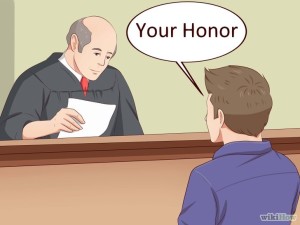
Can I represent myself in General Sessions Court?
Can you represent yourself in General Sessions Court?
Yes, you may always represent yourself in any court matter – it’s called proceeding pro se. However, you may only represent yourself.
If the true party in the case is actually a corporation or limited liability company (LLC) – even if you are the sole shareholder/owner/member – then you may not represent “yourself” because, technically-speaking, a business organization is a distinct legal entity separate and apart from you as a natural person. And unless you are a lawyer, you cannot represent another person or entity, or else you would be guilty of the unauthorized practice of law, and no Judge will allow that.
Should you represent yourself in General Sessions Court?
If you are the party in the case as an individual, or as a sole proprietorship, then you may always represent yourself. The real question, though, is should you? Many people believe General Sessions Court is a “small claims court” similar to the TV court shows where two parties stand at podiums and, with great drama, show or tell the Judge whatever they want. While it is true that General Sessions Court disputes are typically limited to smaller matters under $25,000, and further that any judgment can be appealed to Circuit Court, it would be a mistake to assume that General Sessions Court is somehow informal or easy.
In many cases, litigating in General Sessions Court is easier and less expensive than litigating in Circuit Court. However, General Sessions Court is serious. All parties, even those representing themselves, must follow the Rules of Court and the Tennessee Rules of Evidence and must observe the proper rules of courtroom decorum. You cannot simply tell or show the Judge whatever you want.
So the question really is this: do you know the Tennessee Rules of Evidence? Do you know what makes a piece of evidence objectionable? Do you know how to lay a proper foundation to get a document or a witness’s testimony admitted in evidence? Attorneys are trained to know the rules and to use them to their client’s advantage. You may have a perfectly winnable case and lose it because you do not know how to properly present evidence. We’ve seen it hundreds of times.
Many people say they cannot afford an attorney, while others simply don’t want to pay an attorney to handle something they believe they can handle themselves. However, is the potential of recovering nothing on your claim – or, conversely, subjecting yourself to a judgment that will be reported to creditors – preferable to paying an attorney fee?
Helpful Resources for pro se litigants
If you truly can’t afford to hire an attorney, here are a few resources you may find helpful:
Rules of General Sessions Court (Shelby County)
General Sessions Court–Civil Case Forms
Attorney of the Day Courthouse Project. Each Thursday Memphis Area Legal Services hosts an advice clinic at the Shelby County Courthouse at 140 Adams Avenue in Memphis. Volunteer attorneys meet with walk-in clients and provide advice and counsel. The clinic starts at 1:30 p.m. in Room 134 of the Courthouse.
Saturday Legal Clinics. These clinics, also hosted by Memphis Area Legal Services, operate on a first come, first served basis and provide opportunity for members of the community to meet with an attorney to discuss their legal issues. Volunteer attorneys provide advice, counsel, referrals. Memphis clinics are held the second Saturday of every month at the Benjamin Hooks Main Library, 3030 Poplar Avenue, starting at 9:30 a.m. until 12:30 p.m. Covington clinics are held on a Saturday every other month at First Presbyterian Church, 403 S. Main Street, starting at 10:30 a.m. until 1:30 p.m.
We practice in General Sessions Court.
The attorneys at Patterson Bray regularly practice in General Sessions Courts in Memphis, Shelby County. We know the rules and we will use them to effectively present your case or defense to the Judge. We represent both Plaintiffs and Defendants. If you have a pending General Sessions case, or if you are thinking of suing someone in General Sessions Court, and you’d like to talk to us about it, please call us at 901-372-5003.





 Call
Call 



 Law FAQ: I was in a car wreck in Tennessee, and I may be partially at fault. Do I still have a legal claim?
Law FAQ: I was in a car wreck in Tennessee, and I may be partially at fault. Do I still have a legal claim? In a car wreck case, or any other case, “negligence” is the legal term for failing to exercise reasonable care and caution under a given set of circumstances. It is commonly referred to as “the ordinary, reasonable person” standard. Legal liability is assessed when a person fails to follow society’s most basic “rules of the road” so to speak.
In a car wreck case, or any other case, “negligence” is the legal term for failing to exercise reasonable care and caution under a given set of circumstances. It is commonly referred to as “the ordinary, reasonable person” standard. Legal liability is assessed when a person fails to follow society’s most basic “rules of the road” so to speak.
 Under Tennessee law, a driver is required to maintain liability insurance to cover any damages that the driver might cause in a car wreck or related accident. That way, innocent victims are protected. Unfortunately, though, the minimum legal limit required under Tennessee law for liability coverage is only $25,000 — which is extremely low. A car wreck can easily exhaust $25,000 in coverage. And, of course, many drivers choose to violate the law by not carrying any auto insurance at all. We see it all the time here in Memphis. This is why you need uninsured motorist coverage or “UM” coverage.
Under Tennessee law, a driver is required to maintain liability insurance to cover any damages that the driver might cause in a car wreck or related accident. That way, innocent victims are protected. Unfortunately, though, the minimum legal limit required under Tennessee law for liability coverage is only $25,000 — which is extremely low. A car wreck can easily exhaust $25,000 in coverage. And, of course, many drivers choose to violate the law by not carrying any auto insurance at all. We see it all the time here in Memphis. This is why you need uninsured motorist coverage or “UM” coverage.